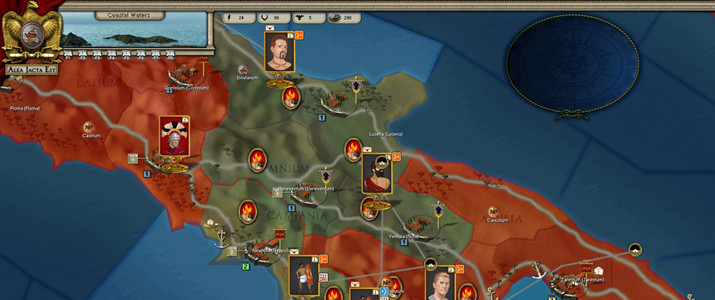
- #Alea jacta est: spartacus 73bc credits full#
- #Alea jacta est: spartacus 73bc credits professional#
- #Alea jacta est: spartacus 73bc credits free#
Besides gaining an army to confront the Germanic tribes, he also gained the loyalty of these men. With little hope of gaining status in other ways, the masses flocked to join Marius in his new army.

#Alea jacta est: spartacus 73bc credits professional#
Marius offered the disenfranchised masses permanent employment for pay as a professional army, and the opportunity to gain spoils on campaign along with retirement benefits, such as land. There simply weren't enough landowners available who weren't already fighting the Germanics or Jugurtha to field a new army. By the time Marius came to power, the typical Roman recruiting base was literally non-existent. The jobless and landless mobs in Rome swelled out of control and led directly to the rise of the Gracchi, who championed political reform for the common citizens. Wealthy senatorial aristocrats and equestrian elite land owners bought up small farms from struggling families and worked them with vast numbers of imported slaves. Prior to Marius, Rome recruited its main legionary force from the landowning citizen classes, men who could equip themselves and who supposedly had the most to lose in the case of Roman defeat.Įspecially since the end of the Punic Wars and conquests in the east, the small landowning classes had dwindled to dangerous numbers. Thoroughly defeated in every engagement, Rome faced a manpower crisis similar to those faced during Hannibal's offensive in the Second Punic War. Invasions of Germanic Cimbri and Teuton tribes into southern Gaul had forced large Roman armies to counter them. Pompeius, coming back from Hispania, will crush the last band in Northern Italy and will claim the whole glory of the wars which had nevertheless been won by Crassus.With his election as Consul in 107 BC, and his subsequent appointment as commander of the Roman legions in Numidia, Marius faced a difficult challenge. Spartacus will fall among his breathens in the midst of a battle, and his body will never be found.
#Alea jacta est: spartacus 73bc credits full#
This was the start of an epic that would see Rome tremble for three year, and the full mobilization of all the forces of the republic was required in the end to crush that mortal peril!Īfter having set Italy ablaze, the slaves armies were finally beaten by the wealthy and ambitious Crassus, at the cost of thousands of deaths and executions. Upon hearing the news, thousands of slaves, shepherds and poor people join Spartacus' ranks. Using wild vine plants to cross the cliffs, the gladiators take their opponent by surprise and send them routing. Having taken refuge on the slope of the Vesuvius, they were besieged there by the troops of Praetor Glaber. But in 73BC, no one could envision that the small light ignited by the escape of a few Capuan gladiators would turn all of Italy aflame.įrom the ludus (gladiator school) of a so-called Lentulus Batiatus in Capua, the Thracian Spartacus leads his fellow men into escape, carrying brands with which they put the local militia to flight. In 133 and 101 BC, two revolts had degenerated in large servile wars in Sicily, and took years to be crushed.


Whereas a few slaves, usually employed at home, could become freedmen after earning their liberty from their masters, the great majority could envision no hope and were badly treated.
#Alea jacta est: spartacus 73bc credits free#
This proletariat will be the base on which ambitious and demagogic politicians will play, offering 'bread and games', to make them their clients against the Senate.Īs for the thousands of slaves, they replace the former free workers as laborers for all the hardest tasks, in the mines, careers and Latifundias, the large estates of the rich Roman citizens, usually in Southern Italy and Sicily.

This large mass of costless manpower quickly leads poor Roman free workers to misery, inactivity and anger. Among one of the results of the victorious conquests, there is a huge influx of slaves into Italy which creates long term dramatic consequences. Roman territorial expansion after the Punic Wars has led to major political, economic and social changes.


 0 kommentar(er)
0 kommentar(er)
